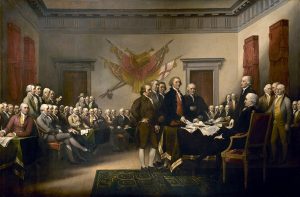The United States Declaration of Independence is the statement adopted by the Second Continental Congress on July 4, 1776. The Declaration announced that the Thirteen Colonies—then at war with the Kingdom of Great Britain—would regard themselves as thirteen independent sovereign states, no longer under British rule. On August 2, 56 men signed the Declaration of Independence, pledging their lives, fortunes, and honor to the cause of liberty and independence. Among these signers was Benjamin Franklin, one of the most influential and well-known Americans of his time.
The Pennsylvania Assembly voted Franklin as their delegate to the Second Continental Congress in 1776. Then in June, he was appointed to the Committee of Five that was tasked with drafting the Declaration of Independence. This five-person committee also included Thomas Jefferson, John Adams, Robert Livingston, and Roger Sherman.
At this time, Franklin was suffering from gout and unable to attend most meetings. But when Jefferson, the document’s primary author, sent him the draft, he could still make minimal yet important changes before the declaration was presented to the Continental Congress. Along with Adams, Franklin changed passages that he thought would cause controversy, such as assigning blame to the British people rather than just their government.
When the Declaration was presented to the Committee, it had a total of 47 alterations and an additional three paragraphs. Congress then made 39 more revisions before finally adopting the Declaration of Independence on July 4. A day later, the final copy of the document was released to the public. And on August 2, 56 men signed it, including Benjamin Franklin. Their signatures stand as their testament to their commitment to the revolution and the creation of a new nation.
The concept of American independence was driven by the result of The Seven Years’ War. It was a global conflict between the major European colonial powers at the time—Great Britain, France, Spain, and Portugal. The war had been expensive for the British Parliament. They decided to impose new tax regulations on their colonies to pay off their war debts. This led to rising tensions between the colonists and the Crown, eventually culminating in the American Revolution.
